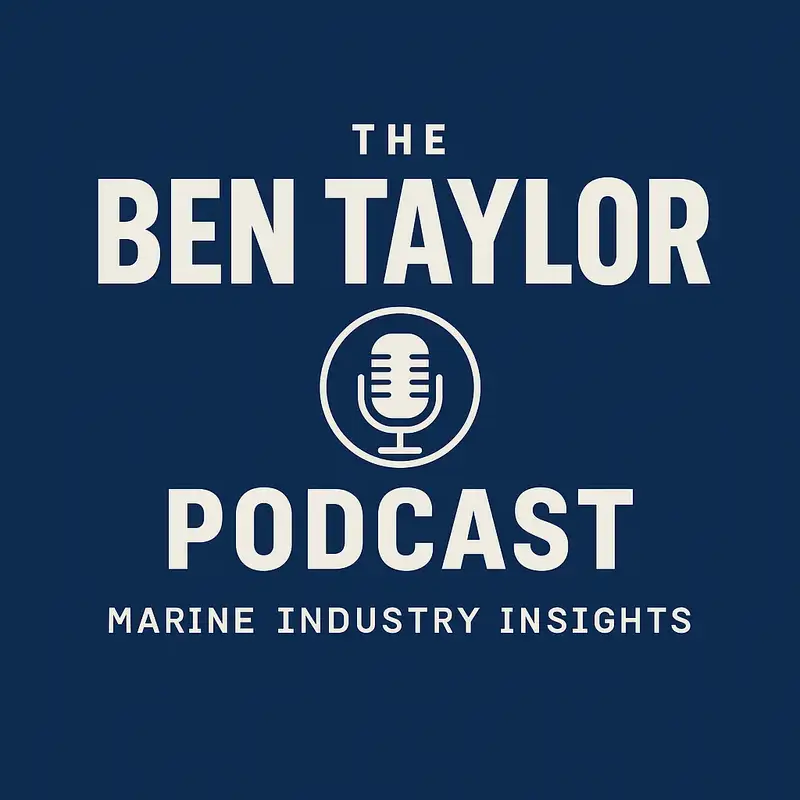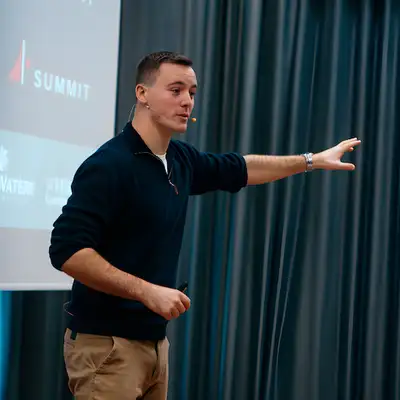
Hybrid Boats In Australia
While he's out fishing, it can not only do autopilot, it can also chase fish and chase where the tuna are. This is all happening. This is the Ben Taylor podcast, the home of marine industry insights. Enjoy. Hi, everybody. Welcome to another episode of the Ben Taylor podcast. This is part of a little series designed to profile the Australian yachting industry. And today I'm with Alan Steber. Nice to see you, Alan. Thank you very much, Ben. Yeah, you're very welcome. So give us a bit of context. Who are you? What do you do? OK, we are an Australian firm boat building for 79 years this year. Family business. Congratulations. Yes. Originally post-war in timber boats. So they're moving into the smaller range of boats in fiberglass in 1961, relocating a factory many times. And now in the country area of New South Wales. And we produce up to 65 feet in length. And employ a lot of people in a rural scene. And what's what's the core of the business? Because you've mentioned hybridization. Is that a massive focus for the industry? Is this is this a new thing or what? It has. But over the years, we've developed to building commercial vessels. So we do police patrol, rescue boats and defense projects. And we progressed up. The world needs to eat. So commercial fishing has been an enormous part. So we have hundreds of boats in the small range. We've built over 10,000 small runabouts. And there were over 500 of the larger vessels. So we're not the big players. We're in there and we are producing quality products. That sounds like an awful lot. Well, it is. It is. And, you know, in a regional area, we have to launch our boats in a river. We cross a bar to get across to sea and we navigate the boats up and down the coast. And so tell me a little bit more about this hybrid thing. What what are you doing? So the latest we go hybrid. So we are looking at what we have developed in the last 18 months. We've produced an electric hybrid boats, twin 600 volt, 300 kilowatt electric motors. They're all water cooled, water cooled charging systems through the survey codes. And this is a new revolution that we are trying to assist in greening, decarbonizing for the industry. So even commercial fishing boats that will go out through a port and go out when they get to the marine parks or going through various areas, they can shut the main engines down if necessary and just go on electric so they can pull up their electrics. We're getting from high. Some of the biggest problems that commercial fishers have is hydraulic hoses, failing hydraulic pumps and things. Right. These will all be electric motors, electric motors, but it'll be bringing in winch gear and stuff. So it is a game changer. We're pushing that field as far as we possibly can. We've got natural cooling systems of water through the what's the glycol heat exchange system. Right. We can utilize that and enhance that water cooling system and put a lot of power through. OK. And where do these conversations start? So somebody is looking at hybridization, maybe changing the fleet into hybrid propulsion. What tends to be that first conversation? I think we're getting the demand from the public. If you want to say you can build a lot of things, rockets to the moon. But will you sell them? Not necessarily. That's the challenge. That is a challenge. But OK, the retailer that walks in and says, where do I get these prawns from or these fish from? There are areas in there that these are caught on the east coast of New South Wales, and these fish are caught off a boat that is just save two and a half ton of carbon. OK, so public will then come in and demand. We want that product and not this product over here. There's caught in another country that's imported and that river is polluted. So it's the sustainability message that's driving. Correct. OK. And is that is that true for white boats, for recreational boats as well? It is coming further. The last round of police boats that we put a bid in had electric jet skis. Now, that can be whisper diving boats, charter boats, whisper going out to the outer reefs. Things will quiet down and they want the quiet. Many years ago, we had people at the boat shows we were exhibiting and the public, some people have back injuries. And I can't have a boat that doesn't bounce. I can't have a boat that's quiet because granddad's deaf or he's got issues and those sort of things. So the public come and talk to us. The public want to buy the fish. They want to tell us as boat builders what we need to do. But do they do they want to buy it? Do they want to fund the hybridization over a period of time that if you're a commercial fisher, there's a payback period if you use your boat seven days a week. Yeah, I get 20, you know, for commercial fishing. The payback period for the extra electrification is about four and a half to five years. If you use your boat very little, it might be 20 years. But the benefits of it is the resale value is going to be greater. There's going to be more need. There are cities around the world that refuse to have diesels in their CBDs. We're going to find it in some of the metropolitan areas and that diesel will keep that out. It will be electric boats, electric tugs, electric cleaning vessels, electric jet skis that will be allowed in those harbors and not the others. And they'll be kept down. Hydrographic survey boats going on reef fronts and around corners and and harbor launches to checking for contraband and underwater, you know, issues. These things can all be electric. Yeah. We also have a market for the old batteries when they're not in use. Outback power stations in Australia, we've got a field to to have those. Let's say in 10 years time, the batteries are not going back to their full capacity. They only go back to 80 percent capacity. That's the time when we can say, OK, then swap the batteries out. They will be improved as technology comes in. They'll be probably half the size. Those old batteries can be used in power station. We have a market for those there. That's quite interesting. Yeah. And so and so strategically, are you just trying to get a little bit ahead, get used to these technologies and have those projects in the pipeline or past projects ready for the adoption? We're 18 months ahead of the regulator at the moment. OK. Right. In those sort of fields. We're also utilizing Australian rules and regulations, et cetera, which follow the the DNVs and the Lloyds. They're quite, quite favorable. Good environment for development. Obviously, they're all pitching together. But we've also got the smart intellectual PhD students in electrical engineering. Today, your telephone can send all the details of all of your batteries, your cooling systems, your charging systems, all of that. We've just had a presentation on AI. That's in our boats today. Yeah, it is incredible. And it's moving very fast. So as a manufacturer, we've got the core of doing defense boats, minesweepers, USVs, unmanned surface vessels. We've done those. The GO hybrid is the next level for us. And you don't have the range anxieties. Following your batteries will last, depending on your capacities, 15 knots for half a day or eight knots for a day and a half or whatever your application is. We have the generator on board to recharge through a cooling system to either put power to the batteries, power to the electric motors or power to both. Yes, a very, very similar concept to the hybridization of cars. When it's more appropriate for the diesel proportion to be to be used. You can. You can. If you can use fully electric. Yes, you can. And it's a best of both worlds in an ideal world. It is. It is. And FRP boat, which is the composites. There is fire retardant materials, heat transfer, water cooling systems. We have sourced and spent the time to develop with the PhD students. And the torque on an electric motor is extremely high, higher than a diesel. So, for instance, standing start. But with the smarts, the PhD students can actually slow down the acceleration to get the maximum power that can talk back to you to say if you throttle back 20 revs, you will get so much more efficiency for your distance. It's getting really smart talking to you on a boat. It might do it on a car, but it can talk to you on a boat. Yeah. And it can stand back. A man, a commercial fisherman can have the smarts that, OK, while he's out fishing, it can not only do autopilot, but can also chase fish and chase where the tuna are. This is all happening now. Yeah. Not last year. Now, you know, it's it's good. OK, great. Alan, thank you so much for your insights. Thanks for coming on the podcast. And I'll see you around. Thank you very much, Pete. All the best. Thank you. Everybody, I hope you found that insightful and useful information to you. If so, make sure you follow in here. All being well, we'll see you again on the next one. Bye for now. Thank you. Thank you for listening to another episode of the Ben Taylor podcast, the home of Marine Industry Insights. We'll see you again very soon. Bye for now.
Creators and Guests
